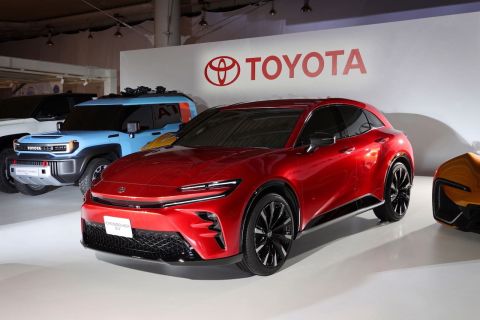Toyota bZ3 electric hatch to compete with Volkswagen ID.3 in Japan
The Toyota bZ3 zero-emissions hatchback, one of several upcoming electric vehicles (EVs) from the Japanese automobile brand, is being seen as a strong competitor to the Volkswagen ID.3 battery electric family car.
In December 2021, Toyota used a major press event to preview its future EV plans. Nearly one and a half dozen EVs are currently under development by Toyota and its luxury car brand Lexus. A number of EVs, including a compact hatchback/crossover, were shown in prototype form during the event. In a new rendering, the bZ3 zero-emissions hatch prototype has been shown morphing into a production vehicle.
Tentatively known as the bZ3, the electric hatch is currently in the early stages of development. As per available information it takes the shape of a slightly lifted five-door EV featuring crossover-inspired tweaks and a muscular side profile. One can consider it as a blend of the existing CH-R and Corolla Hatchback as it seems to be smaller than the Corolla but larger than the crossover.
Based on the Japanese automobile giant’s EV-dedicated e-TNGA architecture, the Toyota bZ3 all-electric hatch will reportedly come equipped with one or two powerful electric motors. The most powerful version of the EV is widely expected to sport a dual-motor system to produce more than 200 horsepower (roughly 149 kilowatts). It is also expected to have all-wheel drive (AWD) drivetrain, which will put it in direct competition with the upcoming Volkswagen ID.3 GTX electric hatch.
When it comes to battery and range, the bZ3 will likely get a massive 71.4-kWh battery pack which will be able to store enough energy to deliver a range of more than 310 miles (500 kilometers) on a single charge.
The upcoming bZ3 electric hatch represents Toyota’s accelerating shift from conventional internal combustion engines to electric powertrains. For a long time, Toyota kept insisted that instant shift to EVs would be in the best interest of neither consumers nor manufacturers. However, it eventually had to bow to the trend, and announce an array of EVs. At the aforementioned press conference, the renowned automaker had also previewed a large seven-seat electric SUV, an electric Tacoma truck, a sports car, and an ideological successor to the FJ Cruiser. In turn, its luxury car division Lexus teased the RZ, which has already made its full debut. By 2030, Toyota and Lexus want to invest $70 billion in research & development to produce at least 30 new EVs.
